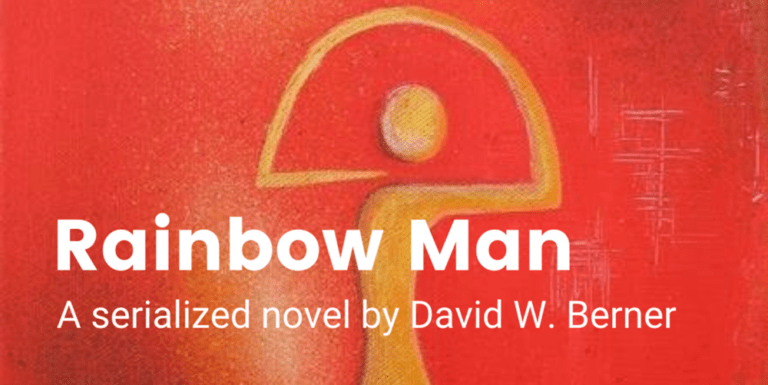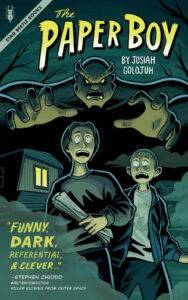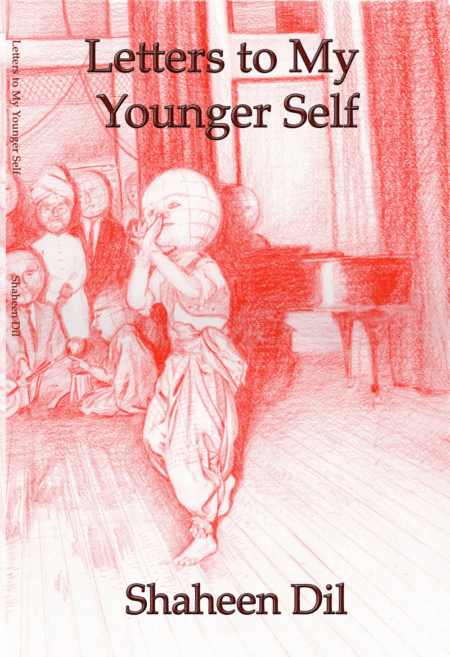From the Publisher: “Welcome to Rainbow Man, a Novel by award-winning author David W. Berner. The serialized story of a grieving widower who travels to Spain to seek solace only to find himself entangled in a young woman’s secret past.
Rainbow Man begins this January 17, 2022.
Look for a new chapter every week. The first installments are free. Subscription will then be your option to complete the novel. Look for the debut in January.”
More Info About the Author: David W. Berner is the recipient of honors and awards from The Society of Midland Authors, The Chicago Writers Association, and the Eric Hoffer Book Awards. He has been the Writer-in-Residence for the Jack Kerouac Project in Orlando, where he was privileged to live and work at the Kerouac House for two-and-a-half months. He later was honored as the Writer-in-Residence at the Ernest Hemingway Birthplace Home in Oak Park, Illinois.
His memoirs reflect on our collective relationships and how those experiences link us to the world we share. David’s stories are about fathers and sons, the redemptive power of road trips, travel, music, and the sage-like connections we share with pets.
David was born in Pittsburgh, PA and now lives in the Chicago area. Along with his writing credentials, David has had a distinguished career as a broadcast journalist, reporting for the CBS Radio Network, WBBM Radio Chicago, and public radio outlets throughout America.
Author Site
Chapter One
 Robert wrecked the rental car. It skipped the curb and clipped a fire hydrant and the front bumper on the passenger side was bent several inches in toward the wheel well, a black rubber piece had torn away from the fiberglass. Fiberglass and rubber don’t do well against cast iron. Robert recalled the day when a car’s bumper was a real bumper, made of steel. There would have been little harm if carmakers hadn’t become so cheap over the years, he thought. The damage wasn’t terrible, and the car was drivable, but there it was anyway, damage to a car that wasn’t his, a Chevy Impala that had been in his possession for less than a week. He now had to report what had happened but couldn’t find the phone number for the rental car company. He believed the agent had written it on the outside of the contract envelope, and Robert thought he had tucked the paperwork under the visor, but in the minutes after the crash when he searched for it, it wasn’t there. He pulled the car off the sidewalk and away from the hydrant, found the closest street parking, and sat inside, searching. He looked in the glove compartment, on the floor, and in the side pocket of the car’s door. Nothing. Robert reached in the pocket of his windbreaker for his cell phone to call his daughter to alert her that he would be late, and there it was, the contract folded neatly in half. Oh, yeah, I’d slipped it away there when I picked up the car. He made the phone call to the rental company. An agent was expected in an hour, and Robert would wait in the bar across the street.
Robert wrecked the rental car. It skipped the curb and clipped a fire hydrant and the front bumper on the passenger side was bent several inches in toward the wheel well, a black rubber piece had torn away from the fiberglass. Fiberglass and rubber don’t do well against cast iron. Robert recalled the day when a car’s bumper was a real bumper, made of steel. There would have been little harm if carmakers hadn’t become so cheap over the years, he thought. The damage wasn’t terrible, and the car was drivable, but there it was anyway, damage to a car that wasn’t his, a Chevy Impala that had been in his possession for less than a week. He now had to report what had happened but couldn’t find the phone number for the rental car company. He believed the agent had written it on the outside of the contract envelope, and Robert thought he had tucked the paperwork under the visor, but in the minutes after the crash when he searched for it, it wasn’t there. He pulled the car off the sidewalk and away from the hydrant, found the closest street parking, and sat inside, searching. He looked in the glove compartment, on the floor, and in the side pocket of the car’s door. Nothing. Robert reached in the pocket of his windbreaker for his cell phone to call his daughter to alert her that he would be late, and there it was, the contract folded neatly in half. Oh, yeah, I’d slipped it away there when I picked up the car. He made the phone call to the rental company. An agent was expected in an hour, and Robert would wait in the bar across the street.
Robert liked a beer now and then, but he wasn’t much of a drinker, a few beers at the ball game now and then was about it. He hadn’t been inside Bigham Tavern since it changed hands. It was Kalb’s for years. The new owners had spruced it up. Brought in some craft beer. They were serving wings now. The barstools were new. No more cracked vinyl. A beer sounded good, but with the rental car rep on his way, Robert had second thoughts. Still, he took a seat at the long bar.
“It’s after the noon hour and it’s almost five o’clock,” the bartender said, smiling. He was a young man, about twenty-five or so, wearing a black Pirates cap, a large compass tattoo on his forearm.
“It’s not about that, really,” Robert said. “I had a little fender bender so I’m waiting for service.”
“Ah, man. Are you okay?”
“It’s minor.”
The bartender slapped a cardboard coaster on the bar, one with the tavern’s name on it. “You deserve a beer, I would say,” he said.
“Car rental guy might smell it on me,” Robert said.
“I’ll vouch for ya.”
The beer labels on the tap handles touted brews Robert had never heard of before—Fat Tire. Red Duck. Something called Vanilla Porter. He asked for a Rock, something familiar. They had it in bottles.
“Rolling Rock used to be brewed in Latrobe,” Robert said. “Arnie’s hometown.”
A Pennsylvania hero, Arnold Palmer had lived his whole life in the small town where he grew up. He died there, too. The bartender had heard Arnie’s story many times, mostly from out-of-towners who wondered in after stepping out to the viewing decks on Mt. Washington to see the glistening city lights below. He could pick out the tourists, always talking Western Pennsylvania trivia as if no one in the city had ever heard any of it before.
“How long you in town for?” the bartender asked.
“I live here. On Piermont. I was on my way to Greentree. My daughter lives there. Shoot,” Robert said, remembering, “I still need to call her.”
Robert took a sip from the green bottle.
He had been on his way to give Debbie the house key so she could retrieve his mail and the newspapers while he was away. He was one of the last on the street to have the Pittsburgh Post-Gazette delivered each day. It would be conspicuous if the papers were left to accumulate on the front walkway. It was Debbie’s idea to come and get them, and it was Debbie who had questioned whether it was the best thing for her father to go overseas alone.
“Hey honey,” Robert said into his phone. He explained the mishap, insisted he was fine, and told his daughter he wasn’t sure when he’d be there. “It might take some time.”
Debbie lived alone in the sprawling apartment complex off the Parkway West. She worked for Dick’s Sporting Goods at the corporate offices in Coraopolis. Robert didn’t know exactly what it was she did, something to do with public relations or marketing or something like that, he believed. When she got the job after graduating from Pitt, Robert asked her if she knew the most famous person to come out of Coraopolis. Michael Keaton, she said, rolling her eyes.
“As soon as I get it straightened out, I’ll call you. It was a dumb thing. Just hit the curb.”
“And you’re sure you’re okay?”
“Fine. Not a big thing.”
“Don’t stand outside and wait. It’s kind of chilly today. Can you go inside somewhere?”
“I’m inside. In Bigham. The bar. The place near me. Sorry to inconvenience you.”
“It’s okay, Dad. Please take your time. I’ll wait for you. And be careful. You sure you don’t want me to come? I can come.”
“No. No. Don’t worry, honey. It’ll all be taken care of in short order.”
The images from three television sets above the bar flickered against the row of glasses on the back shelf. Each screen had been tuned to the same channel and the sound turned low.
“Pirates game last night. Big crowd,” the bartender said.
“Still no player like Clemente,” Robert said.
“Never saw him. Wasn’t even born.”
“Best ever.”
“I hear that a lot.”
“At the game a few days ago. Used to go a lot more than I do now. It’d been a long time. Bucs won. But I lost.”
“How’s that?”
“I usually take the incline and the bus, you know? This time, though, I thought I’d drive. But the guy in the parking lot hit me. The back of the car. Big hurry. He wasn’t looking. That’s why I have that rental. My car is in the shop.”
“You’ve had some car issues, my friend.”
“You could say that.”
“Your insurance taking care of it, right?”
“It’s going to be several days to repair and I’m heading across the pond. They can keep it for a while.”
Robert lifted the beer bottle to his lips and before tasting, he said, “Spain. I’m going to Spain.”
It had been years since Robert had taken a trip of any kind. The summer before Debbie went to high school, the family had traveled to Nag’s Head for a week, and there was the tenth anniversary trip to Florida, but there had been nothing since, nothing of significance. The only other trips were the seasonal drives with Emma near Seven Springs in the fall to see the leaves. A few months after Emma was gone, Debbie tried to get him to go to Cook Forest for a weekend in the woods, maybe some fishing, a trip together where she could watch over him. It would do him good, she said. Good for her, too. But Robert wasn’t interested. He used to like fishing. He once liked going down to the river on early Saturday mornings. Debbie offered a trip to New York, too. They could see Hamilton, she said. It didn’t happen. It was a year before Robert returned to the ballpark. Leaving the house for anything had been difficult for some time. It was a good house, a good place to hide. He and Emma had lived in the little three-bedroom for thirty years. They bought it a few years after the wedding when Robert had landed the manager job at Giant Eagle. They raised their daughter there, he mowed the small lawn, planted a Japanese maple near the front door stoop, and together they walked as a family to St. Mary’s on Grandview on summer Sundays. After Emma, the house, so empty and quiet, had become Robert’s cocoon. Years later, on a morning in February, he awakened to a bitter wind and big snowfall. Robert stayed in bed, drinking coffee, and reading as the snow piled up. As a New Year’s resolution, he had made a list of books he’d never read but thought he should now that he had the time. It was one of several lists Robert had compiled to jump-start the new year, jump-start him. There was one on movies and a list of card games he had never learned to play. Bridge had always seemed so complicated. There was the flower list, too, plants he had always wanted to try to grow—roses and orchids. Robert had begun to tackle the book list, books that had seemed out of reach. He jumped into War and Peace and gave up; Ulysses and gave up. On that snowy morning it was The Sun Also Rises, and for whatever reason that clicked. He read all day and finished it that night. The next day all he could think about was Spain. The months alone, the isolation falling away after reading Hemingway’s romantic words—the wine, the fishing, and the glorious fiestas. A different world, a new world. Robert couldn’t explain it. Why that book? Why Spain? Most of the book takes place in Paris. Why not Paris? For whatever reason, the chapters on Spain were what hooked him. Robert booked a two-week trip. Spain in the summer. Spain by himself. It all happened just like that.
“Now there’s a trip that sounds amazing,” the bartender said. “You must be retired?”
“A few years now,” Robert said.
“Taking your wife?”
Robert had wondered on the day he’d booked his flight: Would Emma have wanted this trip the way I do? She, too, had never been overseas. Long ago when they were young and dating, they took weekend drives to Lake Erie and spent their days on the beach at Presque Isle. They ate fried fish sandwiches; he drank beer and she sipped white chilled wine at the little place near the beach with the white fence around it and the outside tables near a grove of trees. In Spain, Robert thought, Emma could have sat by the sea, drinking white sangria.
“No. Only me,” Robert said.
He took another swig of Rock, leaving a bit in the bottle, wiped his lips with a bar napkin, and looked toward the door, as if he had anticipated someone walking through it. He placed a five-dollar bill on the table.
“That’ll do it, right? Little tip there, too.”
“You are good, my friend.”
“I better wait by the car,” Robert said.
The bartender removed the empty bottle and swiped a white cloth across the bar. “Always wondered about what a bullfight was really like,” he said.
It wasn’t long before the Avis agent arrived. He inspected the car, asked Robert some questions, and had him fill out paperwork. Robert had agreed to the extra rental insurance when he was handed the keys. It seemed a good thing to do and it turned out it had been. Since the crash was minor, the agent told him to keep the car through the contract’s end. Robert was scheduled to return it in two days. Pulling away to his daughter’s place, the bells of St. Mary rang out, signaling the end of Saturday evening mass. And when he stopped at the corner, Robert saw the bartender standing outside the entrance to Bigham, his back to the wall, cigarette smoke rising above his head.
“I want to hear some stories about matadors!” the bartender shouted.
Robert wasn’t sure about a bullfight. Not sure he could stomach it. Still, coming home with a story or two to tell the bartender would be nice, a story or two to tell his daughter, too. Maybe not tales of bulls and red capes and swords, but memorable stories, nonetheless. Robert hoped to take photos so he could remember those stories, and Debbie had showed him how to work the camera on his phone. He had been practicing taking pictures of the city from Grandview Avenue.
Robert drove down the hill toward the boulevard and onto the Parkway toward his daughter’s apartment. He reminded himself to pack a second bottle of antacids for his trip, another suggestion from Debbie. She worried about his touchy stomach. Robert couldn’t recall if he’d put his new passport, the only one he’d ever had, in the side pocket of his suitcase at home or if it was still on the kitchen table where he’d placed the boarding pass for his flight and the hotel reservation confirmation he had printed from the computer. When he returned home, he’d be sure to check for the passport. And he would check again in the morning and on his way to the airport, double and triple and quadruple check. Of all the things to forget, that would be the worst. His daughter had said he’d been a little forgetful lately. Maybe she was right.
This excerpt from Rainbow Man is published here courtesy of the author and should not be reproduced without permission.


























